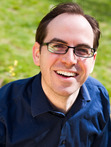Adam Szymkowicz's Blog, page 46
May 1, 2016
I Interview Playwrights Part 829: Anthony P. Pennino
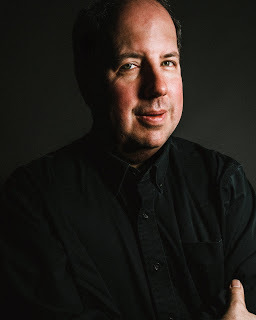
Anthony P. Pennino
Hometown: Princeton, NJ
Current Town: Princeton, NJ (I have circled back here after living in NYC, London, and — for a brief stint — Istanbul.)
Q: Tell me about your upcoming shows.
A: First up is Iron Tongue of Midnight, which will have its opening night at The Neighborhood Playhouse on May 6. The work is being performed by approximately a third of the graduating class (the other two-thirds are split performing in Tom Stoppard’s Rosencrantz and Guildenstern Are Dead or Stephen Adly Guirgis’s The Last Days of Judas Iscariot). The play is about a theatre company in Moscow in 1939 trying to mount a production of A Midsummer Night’s Dream. Company members keeping getting purged, so they plug in actual workers to play the Rude Mechanicals. Second up is Drones, which will have its premiere at The 2016 Planet Connections Festivity on June 18. This piece is a very loose adaptation of an incident in The Iliad. The work concerns our seeming inability not to be at war and posits a world where The Trojan War essentially never ended (complete with modern military technology). Third up is a revival of my long one-act Misty Phantoms, which enters into a conversation with William Faulkner over genocide of Native Americans. This work will be a part of the Thespis Theatre Festival in July. Finally, my play Chokehold will be returning on September 15 at the 14th Street Y. This is its second run. It originally premiered in the 2015 Planet Connections Festivity. This piece addresses police violence in African-American communities and concerns five friends who make a very radical choice to call attention to the problem.
Q: What else are you working on now?
A: I am part of a theatre company — Core Creative Productions — and we are planning on developing a piece about Nelson Mandela’s time on Robben Island. He and the prisoners there had access to the complete works of William Shakespeare, and it served as a lifeline for them.
Q: Tell me, if you will, a story from your childhood that explains who you are as a writer or as a person.
A: Not quite from childhood, but when I was in college, James Shapiro (The Year of Lear, Shakespeare and the Jews) was my Shakespeare professor. Rather than placing The Bard up on a pedestal, Shapiro dived into the world of Shakespeare’s London, what a production in The Rose or The Globe would have been like, how the plays would have been received and what meaning they would have for the audience. His approach was to strip away the myth, but it made the plays and the man behind them so much more alive and vital. I wanted to be a part of something that entered into the bloodstream of a national culture conversation, reported on but also defined what in a sense was a city that was reconceiving itself in a global context. I wanted to be a part of an art form that could do all of that.
Q: Who are or were your theatrical heroes?
A: John Patrick Shanley — I am in awe of his ability to delve into the realm of belief and moral conscience. I still have a clear vision of Cherry Jones at the end of Doubt wracked with doubt. Suzan-Lori Parks — I thought her Father Comes Home from the Wars was audacious and brilliant, truly an American Homeric epic. Tony Kushner — the clarity and urgency of his voice with Angels in America is inspiring. Stephen Adly Guirgis — for his unerring ability to marry dialogue to character. And, of course, August Wilson — he did what Shakespeare did: made theatre national history. I am still trying to wrap my head around the enormity of Lin-Manuel Miranda’s contribution. Among actors: Philip Seymour Hoffman, Jeffrey Wright, Cherry Jones, Mark Rylance, Audra McDonald, and Ben Whislaw.
Q: What kind of theater excites you?
A: You know, I really do just love the theater, and I am pretty much prepared to see anything as long as it gets the juices flowing. I love new work and reinterpretations of the classics. I really want to hear the writer’s voice, but also that of the actors and director. For my day job, I am a literature professor, and I frequently teach Shakespeare. What I do not like is someone who presents a “museum” production of Shakespeare (or Moliere or Ibsen or Chekhov or whatever). I want the director, the actors, the designers to engage with the text, wrestle it the ground, and find a way to elide their voices with the original. I hate to see productions that play it safe — what Peter Brook described as deadly theatre.
Q: What advice do you have for playwrights just starting out?
A: The first audience you have to please is yourself.
---------------------------------------------------------------------------------------------------------
Enter Your Email To Have New Blog Posts Sent To You
-----------------------------------------------------------------------------------------------------------
Support The Blog

-----------------------------------------------------------------------------------------------------------
Mailing list to be invited to Adam's events
Email:
------------------------------------------------------------------------------------------------------------
Adam's Patreon
Books by Adam (Amazon)
Adam's New Play Exchange Profile (Plays to Read)







Published on May 01, 2016 08:45
April 30, 2016
I Interview Playwrights Part 828: Justin Kuritzkes
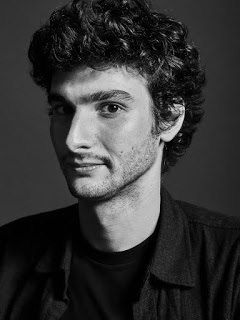
Justin Kuritzkes
Hometown: Los Angeles, CA
Current Town: New York, NY
Q: Tell me about The Sensuality Party.
A: The Sensuality Party is about six college students -- three women and three men -- who decide to have a group sex experience together during their first semester. The night eventually goes horribly wrong, and they have to deal with the consequences. It's also about war and terror and violence and how we're all perpetually embedded in a network of violence, both physical and systemic, even when our immediate surroundings appear to be peaceful, safe, and benign. I wrote the first draft of the play a little over four years ago while I was an undergrad at Brown, and I performed it then in dorm buildings and people's apartments. Now The New Group is doing the play in college common rooms around the five boroughs of New York City. The show is directed by Danya Taymor, and it stars Catherine Combs, Jeff Cuttler, Katherine Folk-Sullivan, Jake Horowitz, Layla Khoshnoudi, and Rowan Vickers. More info and tickets here: http://www.thenewgroup.org/the-sensuality-party.html
Q: What else are you working on now?
A: I just finished the first draft of a screenplay about Ronald Reagan, and I've been recording a pop album called Songs About My Wife. I also recently finished a play called Bro Lyfe, which is about various kinds of "bros" trying to grow up and find their way in society. Other recent plays include: Asshole, a monologue about a doctor who works for the government and likes the smell of his own shit, and Das Naz, a play about two members of the SS who one day realize the immorality of their entire enterprise after killing a Jew Baby. Mostly, I'd really love to get a TV job.
Q: Tell me, if you will, a story from your childhood that explains who you are as a writer or as a person.
A: When I was really little -- maybe 5 or 6 -- my parents sent me to a sports day camp. One day after swimming, I got completely naked in the boys' locker room and ran around calling myself the "naked mascot." I would run up to people and wave my penis around at them and scream things in weird accents. I thought it was all cool and everyone was having a good time, but apparently one of the boys complained to a counselor and so when my mom came to pick me up, one of the counselors came to talk to her in the car. I immediately understood that I was in trouble, and I ran out of the car and started crying and screaming in the grass. On the drive home, my mom said: "We won't tell dad."
Q: If you could change one thing about theater, what would it be?
A: Theaters tend to make choices about what to produce based on a calculation about what "their audiences" will like. I think it would be great if the big theaters had the courage to say: "Fuck 'our' audience. We don't own them and they don't own us. We'll put on whatever we want," and then start doing more of the crazy, actually interesting stuff that some of the smaller theaters are already doing. Part of the reason why so much theater in the city right now is so bland and careful and tasteful is that playwrights and directors are told -- either explicitly or implicitly -- that "the audience" has real limits to what they can handle, and so if you want to make any money as a playwright or get anywhere in your career, you'd better play by the rules. As a result, the plays stay mostly the same and so does "the audience." There's a reason why most otherwise intelligent and engaged and open-minded people my age don't go to the theater, and it's because they've accurately sniffed out that most of it just isn't being made for them -- it's being made for some condescending idea of what their parents' most boring friends might like.
Q: Who are or were your theatrical heroes?
A: Wallace Shawn, Caryl Churchill, Sarah Kane, Maria Irene Fornes, Edward Albee, Brecht, Beckett, Martin Crimp, Mark Ravenhill, Erik Ehn, and Les Waters. In college, I was lucky enough to study with Gregory Moss and Lisa D'Amour. In high school, I was lucky enough to have mentors and friends like Michele Spears, Ted Walch, and Christopher Moore. They've all made me the writer that I am. I also think Scott Elliot and Ian Morgan are heroes for taking a chance on my play.
Q: What kind of theater excites you?
A: Anything that's honest and not boring.
Q: What advice do you have for playwrights just starting out?
A: Try writing other things too -- you'll most likely need to, and it's better to get good at that sooner rather than later. Don't try to write something that's "producible" because no one gets produced anyway, and when you do, it's a miracle and a fluke. Find directors and actors you love and hold them close. Read the news, and watch TV, and watch movies, and play video games. Mostly, I would say: try to think of yourself as a citizen and as an artist rather than as a "playwright," since almost no one gets to be a "playwright." When you're at your day job, you are no less an artist than when you're at your opening night.
Q: Plugs, please:
A: The Sensuality Party runs through May 13. Info and tickets: http://www.thenewgroup.org/the-sensuality-party.html
---------------------------------------------------------------------------------------------------------
Enter Your Email To Have New Blog Posts Sent To You
-----------------------------------------------------------------------------------------------------------
Support The Blog

-----------------------------------------------------------------------------------------------------------
Mailing list to be invited to Adam's events
Email:
------------------------------------------------------------------------------------------------------------
Adam's Patreon
Books by Adam (Amazon)
Adam's New Play Exchange Profile (Plays to Read)







Published on April 30, 2016 08:00
April 29, 2016
I Interview Playwrights Part 827: Kristin Idaszak
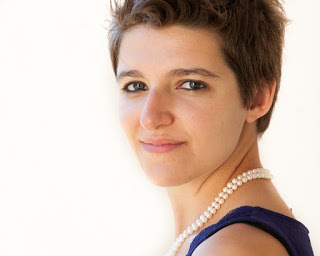
Kristin Idaszak
Hometown: Western Springs, IL
Current Town: Minneapolis, MN
Q: What are you working on now?
A: I’m working on a new play called Lovelier Lovelies, in which a woman tries to adapt a novel about Polish slaughterhouse workers for the stage. (The novel is loosely inspired by Upton Sinclair’s The Jungle.) She fails, and the play gets cancelled. The writer’s forced to present a makeshift slideshow about the Chicago stockyards. What we learn is that in trying to explore her Polish identity, and her great-grandfather’s death on the slaughterhouse floor, she’s actually written a play about a traumatic event in her own past. It’s written half as the presentation and half as rehearsals from the play within the play. The play explores the way narratives get co-opted, and how sediment of identity accrues over the course of generations. And it also asks about staging things that are intrinsically impossible to stage—whether that’s a cattle stampede or an act of sexual violence.
Q: Tell me, if you will, a story from your childhood that explains who you are as a writer or as a person.
A: What comes to mind is more a kaleidoscope of images than a single story: I remember building sets with my dad for the local community theatre. I was the only girl in the scene shop. I remember going to class with my mom when I was off from school but she wasn’t. She was a chemical engineer when I was a little kid, but she went back to school to become a pharmacist. I realize now how brave that was. I remember, for my birthday (maybe my sixth or seventh) I got a detective kit. You could break codes or detect invisible ink. I carried it around everywhere, looking for mysteries to solve.
These fragments explain some of my obsessions, at least, and perhaps circle around who I am as a writer and a person.
Q: If you could change one thing about theater, what would it be?
A: I’d like to see gender parity across the board—writers, directors, designers, actors, technicians, everybody. But there’s so much work to be done, not only in terms of gender, but also in terms of race, ability, and economic inclusivity. There’s a long road ahead of us.
Q: Who are or were your theatrical heroes?
A: First and foremost, my teachers—Naomi Iizuka, Deborah Stein, Adele Shank, Carlos Murillo, Dean Corrin, Coya Paz. These are artists in their own right who have guided me in finding and strengthening my own voice. They’ve helped me understand that teaching is also an artistic practice. Other artists I find heroic are Taylor Mac, Caryl Churchill, and Maria Irene Fornés, to name a few.
Q: What kind of theater excites you?
A: I love spectacle. I love simplicity. I love plays that go by in a heartbeat and plays that last eight hours. I respond to ambitious, unapologetic, impossible theatre—work that is formally inventive and questioning itself. I love when I see something that challenges what theatre can be or do. These days, I’m most excited when I see something that engages with me as an audience member—it needs an audience to be complete. Sometimes that’s immersive or site-responsive work, sometimes it’s in the style or the presentation of the story.
Q: What advice do you have for playwrights just starting out?
A: Find what nourishes you and cultivate that. The body and the mind are inextricable, so take good care of your physical self. I also think that the greater stability you can create—the quiet spaces, a sanctuary within your own life—can allow you to do the deep tissue work of writing.
Q: Plugs, please:
A: You can see my play Second Skin on the beach in Santa Monica until May 15. http://www.theflagshipensemble.com/
The Last Tiger in Haiti by Jeff Augustin at La Jolla Playhouse http://www.lajollaplayhouse.org/tiger-haiti
King of the Yees by Lauren Yee at The Goodman Theatre
https://www.goodmantheatre.org/press-room/2016-2017/King-of-the-Yees/
---------------------------------------------------------------------------------------------------------
Enter Your Email To Have New Blog Posts Sent To You
-----------------------------------------------------------------------------------------------------------
Support The Blog

-----------------------------------------------------------------------------------------------------------
Mailing list to be invited to Adam's events
Email:
------------------------------------------------------------------------------------------------------------
Adam's Patreon
Books by Adam (Amazon)
Adam's New Play Exchange Profile (Plays to Read)







Published on April 29, 2016 07:01
April 28, 2016
I Interview Playwrights Part 826: Emily Feldman
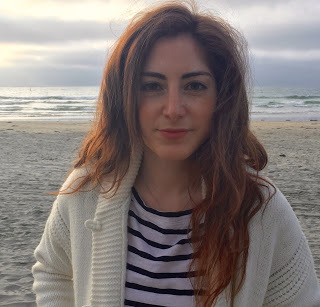
Emily Feldman
Hometown: Baltimore, Pittsburgh, Philadelphia
Current Town: San Diego, CA (for a couple more months)
Q: What are you working on now?
A: I’m in rehearsal at UC San Diego for a play called GO. PLEASE. GO. It takes place in an empty, beige, shag-carpeted box. It follows two young lovers over 70 years and has a repetitive form that’s inspired by Beckett and Thornton Wilder. It has a few dance numbers and a tap break— which you can’t hear because of all the carpet.
Q: Tell me, if you will, a story from your childhood that explains who you are as a writer or as a person.
A: My 92 year-old grandma died at my Bat Mitzvah. I was reading from the Torah and she put her head on my sister’s shoulder and didn’t wake up. I couldn’t believe that something so sad could happen on a day that I had looked forward to for so long. It must have been most difficult for my Dad, who lost his mom while his friends were doing the electric slide.
My best friend wore the same purple dress that I wore and I wish I could say that at that point— it really didn’t matter who wore what dress— but I was twelve.
Something about this family heartbreak on a day that was supposed to be filled with joy has infiltrated my writing and my sense of humor. I’m sure that if I ever get married it will rain on my wedding day.
Q: If you could change one thing about theater, what would it be?
A: I’d like there to be more places for longer forms of theater criticism. Writing that isn’t a thumbs-up or thumbs-down kind of review—but an inquiry into the intentions of the artists and the style of the performance. I think this is happening in a couple of places, but I’d love for more playwrights to write publicly and in-depth about the plays they see— the way that novelists review or blurb each other’s work.
Q: Who are or were your theatrical heroes?
A: Reading Beckett, Ionesco, and Chris Durang when I was in college got me excited about writing plays. Karen Hartman was a great mentor to me when I was living in New York and trying to balance work and playwriting. My heroic playwriting teachers/women who give me excellent advice are Naomi Iizuka and Deborah Stein. I think Adam Greenfield is also a theatrical superhero.
Q: What kind of theater excites you?
A: I get excited by plays that move like dances—that are beautiful and that make inventive use of space and bodies. I love when design and text and performance play like instruments in a symphony and when making theatre looks like painting on a canvas— every element placed in a specific relationship to everything else. David Greenspan’s Go Back To Where You Are at Playwrights Horizons was one of those experiences for me. I saw it four times.
Q: What advice do you have for playwrights just starting out?
A: Naomi Iizuka always reminds me to be kind to everyone I meet working in the theater. Everyone is there for the love of the game and today’s intern could be tomorrow’s artistic director. And you never know who will end up being a great ally or whose couch you might need to spend a night on. I’m haunted by that thing George Saunders said at a commencement in 2013: “What I regret most in my life are failures of kindness."
Q: Plugs, please:
A: If you’re in Southern California in May, come see the Wagner Festival of New Plays at UC San Diego! http://theatre.ucsd.edu/season/WNPF2016/index.htm
And my love Jeff Augustin’s beautiful play The Last Tiger in Haiti at La Jolla Playhouse, directed by my BFF Josh Brody! http://www.lajollaplayhouse.org/tiger...
---------------------------------------------------------------------------------------------------------
Enter Your Email To Have New Blog Posts Sent To You
-----------------------------------------------------------------------------------------------------------
Support The Blog

-----------------------------------------------------------------------------------------------------------
Mailing list to be invited to Adam's events
Email:
------------------------------------------------------------------------------------------------------------
Adam's Patreon
Books by Adam (Amazon)
Adam's New Play Exchange Profile (Plays to Read)







Published on April 28, 2016 06:59
April 20, 2016
UPCOMING THINGS I CAN TALK ABOUT PUBLICLY
Hearts Like Fists
Production #30 of Hearts Like Fists
Shadow Horse Theater
Minneapolis, MN
Opens May 27, 2016
Clown Bar
Production #16 of Clown Bar
Springs Ensemble Theatre
Colorado Springs, CO
Opens May 13, 2016
Production #17 of Clown Bar
Beauty Bar
Las Vegas, NV
Opens June 2016
Pretty Theft
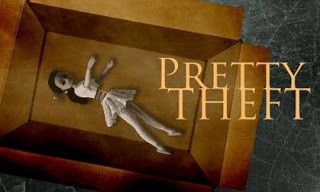
Production #11 of Pretty Theft
James Madison University
Harrisonburg, VA
Opens April 26, 2016
Rare Birds (workshop production)
The Chance Theater
Anaheim, CA
August 4, 6, 7, 2016.
7 Ways to Say I Love You
(a night of short plays)
Production #4 of 7 Ways to Say I Love You
Natomas Pacific Pathways Prep HS
Sacramento, CA
Opens May 11, 2016
Production #5 of 7 Ways to Say I Love You
Portland High School
Portland, ME
Opens May 12, 2016
PUBLISHED PLAYS
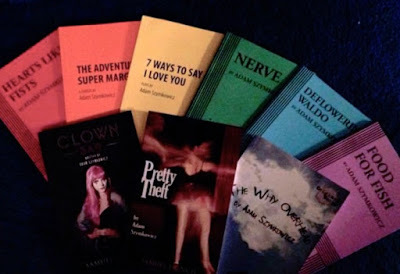
---------------------------------------------------------------------------------------------------------
Enter Your Email To Have New Blog Posts Sent To You
-----------------------------------------------------------------------------------------------------------
Support The Blog

-----------------------------------------------------------------------------------------------------------
Mailing list to be invited to Adam's events
Email:
------------------------------------------------------------------------------------------------------------
Adam's Patreon
Books by Adam (Amazon)
Adam's New Play Exchange Profile (Plays to Read)







Published on April 20, 2016 13:18
April 10, 2016
I Interview Playwrights Part 825: Francis Weiss Rabkin
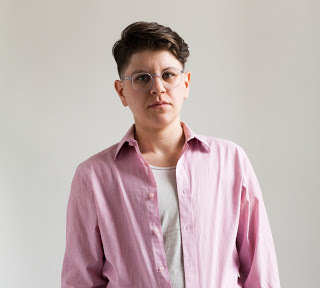
Francis Weiss Rabkin
Hometown: Chicago, IL
Current Town: Brooklyn, NY
Q: Tell me about Won't Be a Ghost.
A: I've been working on Won't Be a Ghost for over two years. When I started out, Chelsea Manning (then Bradley) was on trial for leaking diplomatic cables and classified military documents to Wikileaks. I wanted to write about Chelsea Manning after reading her IM chats with the hacker who turned her in to the FBI, Adrian Lamo. Wired Magazine published the chats, and the intimate conversation gave such a powerful portrait of her motivation, her gender exploration, and her moral character. None of this nuance had made it into the mainstream media's picture of her. When she was sentenced to 35 years in an all-male prison, I wanted to make sure that her voice didn't get lost. In the play we use her own language from the chats. In Berlin last spring, an additional story line emerged. At the Berlin Jewish museum, I came across the history of Magnus Hirschfeld, a Weimar-era gay Jewish sexologist and founder of the Institute for Sexual Science. The Institute was a haven for LGBT people, and in the early 1920s the first gender-affirming surgeries were performed there for transgender people. But in 1933, the Nazis raided the institute and the archive was publicly burned in the first of the Nazi Book Burnings. I hadn't even vaguely heard of this, and as a Jewish transgender person I was so moved to learn this history.
We have this sense that there is continual progress and acceptance, but I don't think progress is at all linear. There was a doctor writing about the acceptance of LGBT people and giving extremely nuanced care to transgender people at the turn of the 20th century. In New York in 2016, I have experienced some incredibly messed up things with doctors who have no idea what to do with a trans patient. And look at what is happening with all of these bathroom bills and religious exemption laws in North Carolina, Tennessee, Mississippi, and more to come. I mean in Mississippi, transgender people can be denied mental health treatment because of religious exemption. When the suicide attempt rate in the transgender population is 10x the rate of the general population, and a state will deny mental health coverage, I don't think we can labor under the delusion that we have progressed very far.
This makes Won't Be a Ghost sound pretty intense, and it is, but there is so much beauty in it as well. We have an incredible cast and gorgeous choral music by Leslie Allison. I think in the face of so much horrific history, it's really powerful to get a group of queer and trans people together to make some beauty out of it all.
Q: What else are you working on now?
A: I am beginning research for a play inspired by radical feminist Marxist scholar, Silvia Federici's Caliban and the Witch. She posits that capitalism wouldn't have been possible without the European Witch Hunt, a reign of terror that decimated women's labor power and connection to their own bodies. I am particularly interested in a part of her book where she draws attention to the cultural importance of late-Feudal/early-Renaissance theater in establishing the witch archetype. I'll be a New York Theater Workshop 2050 Fellow this year, and I'm looking forward to developing this anti-capitalist witch play.
Q: Tell me, if you will, a story from your childhood that explains who you are as a writer or as a person.
A: I was always writing scripts for plays and videos with my sister and our friends as a young kid. I remember lugging around one of those 90s video cameras that recorded straight to VHS tape. But I think what most shaped my sense of self as a writer were the plays I put on as a teenager in my parents backyard in Chicago. When school ended, I got nervous that I wouldn't get to spend as much time with friends, so I wrote a play essentially to force everyone to hang out all the time. It worked out so well that we did it three summers in a row--one summer we had 25 kids working on the play--hanging lights off the garage roof, playing music, building sets and puppets. I think I still make art to get to hang out with people--collaborating is my favorite way to be intimate others. I met my partner, Leslie Allison, through collaborating and now we've started a company together, Tight Braid Group (www.tightbraidgroup.org).
Q: If you could change one thing about theater, what would it be?
A: I feel like theater doesn't reflect enough of our culture. How are we still interested in hetero-family living room dramas? I think theater is way behind compared to what is happening in dance, visual art, even television.
Q: Who are or were your theatrical heroes?
A: Tennessee Williams, Suzan-Lori Parks, Mary Zimmerman, Redmoon Theater, Brecht.
Q: What kind of theater excites you?
A: Ambitious theater. Even if it's sloppy; I like seeing the labor. Interdisciplinary theater, because I think the biggest problem in theater is insularity. When theater makers are only making work for other people in "the theater" then what's the point?
Q: What advice do you have for playwrights just starting out?
A: Work on your friendships. Powerful theater is intimacy.
Q: Plugs, please:
A: Won't Be a Ghost premieres at The Brick Theater April 14-23rd. Tickets and more info here: http://bricktheater.com?type=show&id=1234
---------------------------------------------------------------------------------------------------------
Enter Your Email To Have New Blog Posts Sent To You
-----------------------------------------------------------------------------------------------------------
Support The Blog

-----------------------------------------------------------------------------------------------------------
Mailing list to be invited to Adam's events
Email:
------------------------------------------------------------------------------------------------------------
Adam's Patreon
Books by Adam (Amazon)
Adam's New Play Exchange Profile (Plays to Read)







Published on April 10, 2016 10:53
April 5, 2016
I Interview Playwrights Part 824: Jordan Hall
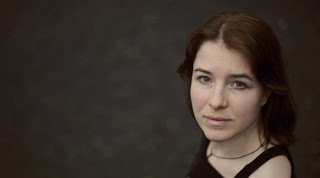
Jordan Hall
Hometown: Waterdown, Ontario
Current Town: Vancouver, British Columbia
Q: What are you working on now?
A: I'm doing the final polishes on How to Survive an Apocalypse, which is premiering in Vancouver at the Firehall Arts Centre in June. I'm also researching and writing the first draft of a piece titled Rate of Loss, which is about our relationship to biodiversity, which is scheduled for production with Up in the Air Theatre in 2017 or 2018.
Q: Tell me, if you will, a story from your childhood that explains who you are as a writer or as a person.
A: In the second grade, I convinced an alarming number of my school friends that we had to prepare for an actual alien invasion. Largely, I suspect, because whenever we played "Unicorns", I was forced to play "Mommy Unicorn", which was tedious. For weeks, we stockpiled supplies (i.e. snacks) in the back of the classroom, as I was forced to come up with increasingly complex explanations for the delayed landfall of the invaders. Eventually, of course, the whole fiction collapsed in a flurry of tears, recriminations, and moldy baby carrots. I consider it a cautionary tale about the amount of effort it would take to start a cult.
Q: If you could change one thing about theater, what would it be?
A: I've got two, and I consider them to be linked and of equal importance. I would like to see more theatre artists (and artists, and really everybody) making a secure living wage. And I would like to see a theatrical producing culture that represents the diversity of contemporary society--gender equity, racial diversity, LGBTQ-representation. I think we all have to do a better job being advocates for ourselves and for others.
Q: Who are or were your theatrical heroes?
A: Beyond the obvious? Aphra Behn. Caryl Churchill. Naomi Wallace. Tom Stoppard. Michael Frayn. Christopher Fry.
Q: What kind of theater excites you?
A: Anything that I can see striving to engage both my heart and my mind. Anything that wants to use form to create revelations about content. Anything that wants me to go away puzzling and thinking and wanting to do better. Anything with a female protagonist who is a fully-developed human being with her own narrative concerns. Anything that shows me a truth I knew, but in a way I didn't know to tell it. Anything full of voices I haven't heard, saying new and dangerous things. Anything that tricks me, fair and square. Also anything with superheroes or physicists or rollercoasters. I'm a sucker for rollercoasters.
Q: What advice do you have for playwrights just starting out?
A: Get up every morning and crack yourself open to see if there's something in there worth a damn. If there isn't, write (and read and live) until there is.
Q: Plugs, please:
A: If you're in Vancouver, you can get tickets for How to Survive an Apocalypse at: http://firehallartscentre.ca/onstage/how-to-survive-an-apocalypse/
Otherwise, I can always be found at:
web: www.jordanhall.ca
twitter: @save_my_script
---------------------------------------------------------------------------------------------------------
Enter Your Email To Have New Blog Posts Sent To You
-----------------------------------------------------------------------------------------------------------
Support The Blog

-----------------------------------------------------------------------------------------------------------
Mailing list to be invited to Adam's events
Email:
------------------------------------------------------------------------------------------------------------
Adam's Patreon
Books by Adam (Amazon)
Adam's New Play Exchange Profile (Plays to Read)







Published on April 05, 2016 08:12
April 4, 2016
I Interview Playwrights Part 823: Ken Greller
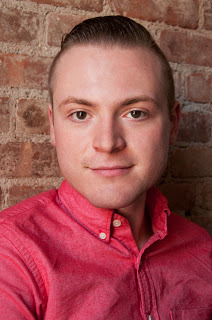
Ken Greller
Hometown: Baltimore, MD
Current Town: The nation-state of Park Slope, Brooklyn, NY
Q: Tell me about Troll.
A: Troll is a play about the internet and New York City - which might be the same thing. It's also a period piece set in 2012. Here's a blurb:
It’s Halloween Weekend, 2012. A storm is brewing, a major election is on the horizon, and it’s generally a horrible time to be young and ambitious in New York—at least for Ari Jacobs, a blogger left desperate, depressed and temporarily homeless in the wake of an unusual break-up. But he’s on the brink of something serious, as he plans to reveal the identity of the biggest Troll in the history of the web, ruining the man behind the persona’s offline life. Is Ari morally capable of squashing one person’s existence in order to turn around his own?
The play is going up this month as the inaugural production of The Rushline Company, which is insanely gratifying. I'd resigned myself to the fact that nobody was ever going to do it - the act of writing it and developing it (the play was my thesis at NYU) was really big for me. It feels like the play on which I really learned how to write a play, and I'd finally gotten to the place of like "Okay, Dayenu, onto the next," and then one day I got an e-mail from two people I've never met saying they want to do my play. Life is funny.
Q: What else are you working on now?
A: I just got back from MacDowell (which is the best place on earth, even when its cold and every creative person of every stripe should be applying to constantly) where I finished a new play - which I think is the third in a "trilogy" about mothers and sons and the suburb of Baltimore that I grew up in.
I'm also writing a screenplay, which is a romcom that's kind of sort of inspired by Vanderpump Rules.
Q: Tell me, if you will, a story from your childhood that explains who you are as a writer or as a person.
A: My grandparents got me started on theatre at an early age - they're the reason I'm a playwright. We would listen to cast albums together all the time - that PBS documentary Broadway: The American Musical was very big for my grandma (Grammy) and I. And then when I was a little older we started going to play-plays, and something clicked (probably because I can't carry a tune so I felt relegated to forever be an audience member when it came to musicals.)
Anyway, when I was five, they took me to my first Broadway show, which was the 1996 revival of The King and I. When the king died (spoiler, I’m sorry) I was BESIDE myself, because I thought he was really dead. I’m five years old and a man just died in front of me onstage. My grandparents tried to reassure me that it was just pretend, but I didn’t buy it until the king came out for curtain call – so I guess that’s how the conceit of live theatre/fictional storytelling got instilled in me.
Q: Who are or were your theatrical heroes?
A: My partner Jeff Augustin, the astonishing literary manager/dramaturg/force of nature Sarah Lunnie, my pal Charlie O'Leary (who reads all of my plays before I do) - These are people who constantly remind me that theatre is a compulsion more than its a career, and that you have to allow yourself to be led by your curiosity, and be a good watcher/reader of things, and generally operate with kindness and decency and excitement and love.
Q: If you could change one thing about theater, what would it be?
A: Ticketing. And not just making tickets cheaper, but making cheaper tickets easier to come by - I know there are ways to get into almost any show without breaking the bank, but I'm sick of it being such a hassle. I don't think that millennials are lazy, but we do like it when things are streamlined. It’s not a matter of being “willing” to spend the money on entertainment. I have plenty of friends who go to movies a few times a week, pay whatever they have to for Netflix and Hulu Plus and HBO Now and whatever else, go to the museum, etc – they would love to go to the theatre, but we live in a world where $40 is a “cheap” ticket, and even to snag that there can be a million steps.
We’re not losing generations of theatre fans this way – where there are high schools letting students direct productions of Spike Heels (true story - shoutout to Peter King and the Park School) there will always be theatre fans – but we’re losing fans of specific writers.We need to cultivate audiences who pay $25 to see John at the Signature, fall in love with Annie Baker and can afford to go see all of her plays wherever they happen.
Q: What kind of theater excites you?
A: The first thing that comes to mind is the wall that crashes to the ground and sends cotton balls flying into the audience in Branden Jacobs-Jenkins' An Octoroon. It's such a perfect meeting point of script and direction and design. And it's legitimately surprising - here's this play laden with these disturbing images that are all about this country's and this art form's history of racism, but then simultaneously, he's making a play about the nature of plays, about how a play by nature is a story that falls apart. I was Branden's assistant when the show first went up at Soho Rep, so I saw that wall fall a lot and it got me every time.
Q: What advice do you have for playwrights just starting out?
A: There’s this line in Sondheim’s Merrily We Roll Along – “Pick yourself a road / get to know the countryside.” I try very hard to take that to heart, because patience is hard for me and I’m always like, how can I enjoy the time between point A and B? But I guess I’m realizing more and more that everything that’s happened for me has been a new kind of “road” – I'm very much still starting out, and the more I accept that the more it feels like I'll be starting out forever -
if you try to make any new experience like some experience before it, you’re kinda bound to fail.
Q: Plugs, please:
A: TROLL runs April 8-24 at the Secret Theater in LIC, which is SUSPICIOUSLY easy to get to. Come!
---------------------------------------------------------------------------------------------------------
Enter Your Email To Have New Blog Posts Sent To You
-----------------------------------------------------------------------------------------------------------
Support The Blog

-----------------------------------------------------------------------------------------------------------
Mailing list to be invited to Adam's events
Email:
------------------------------------------------------------------------------------------------------------
Adam's Patreon
Books by Adam (Amazon)
Adam's New Play Exchange Profile (Plays to Read)







Published on April 04, 2016 09:16
March 31, 2016
Productions of My Plays
Hearts Like Fists
Production #26 of Hearts Like Fists
Theatre Threshold, Cal State University
Long Beach, CA
Opens April 6, 2016
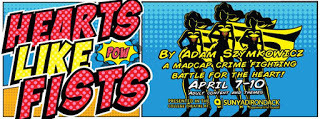
Production #27 of Hearts Like Fists
SUNY Adirondack
Queensbury, NY
Opens April 7, 2016
Production #28 of Hearts Like Fists
University of Findlay
Findlay, OH
Opens April 13, 2016
Production #29 of Hearts Like Fists
Muskingum University
New Concord, OH
Opens April 14, 2016
Production #30 of Hearts Like Fists
Shadow Horse Theater
Minneapolis, MN
Opens May 27, 2016
Clown Bar
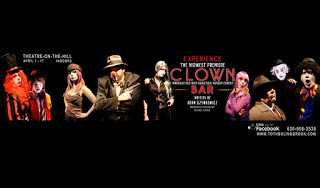
Production #15 of Clown Bar
Theatre-on-the-Hill
Bolingbrook, IL
Opens April 1, 2016
Production #16 of Clown Bar
Springs Ensemble Theatre
Colorado Springs, CO
Opens May 13, 2016
Production #17 of Clown Bar
Beauty Bar
Las Vegas, NV
Opens June 2016
Pretty Theft

Production #11 of Pretty Theft
James Madison University
Harrisonburg, VA
Opens April 26, 2016
TBA (workshop production)
The Chance Theater
Anaheim, CA
August 4, 6, 7, 2016.
7 Ways to Say I Love You
(a night of short plays)
Production #3 of 7 Ways to Say I Love You
Chaparral High School
Las Vegas, NV
Opens April 21, 2016
Production #4 of 7 Ways to Say I Love You
Natomas Pacific Pathways Prep HS
Sacramento, CA
Opens May 11, 2016
PUBLISHED PLAYS

-----------------------------------------------------------------------------------------------------------
Enter Your Email To Have New Blog Posts Sent To You
-------------------------------------------------------------------------------------------------------------
Support The Blog

-------------------------------------------------------------------------------------------------------------
Mailing list to be invited to Adam's events
Email:
--------------------------------------------------------------------------------------------------------------
Books by Adam (Amazon)
Adam's New Play Exchange Profile (Plays to Read)







Published on March 31, 2016 10:39
March 30, 2016
I Interview Playwrights Part 822: McFeely Sam Goodman
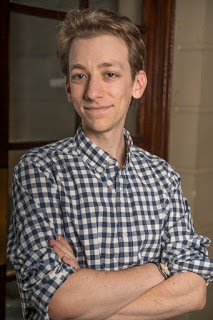
McFeely Sam Goodman
Hometown: New York, NY, by way of Princeton, NJ and Brookline and Cambridge, MA
Current Town: Jersey City, NJ
Q: Tell me about Afterward.
A: Afterward is my MFA thesis at Columbia University. The piece tells the story of my experience as a childhood cancer survivor through a series of monologues in my own voice. Interspersed with the monologues are scenes from an unfinished screenplay for a superhero movie which would have explored the same themes of anxiety, vulnerability, and survivorship through a very different lens.
The whole thing is performed by five performers who share the text and play the roles in the movie. It’s set on the movie set, so that the conceit is that all of the people working on the movie are telling each other their stories which are all actually my story.
It’s being performed April 21st-24th in The Pershing Square Signature Center’s Ford Studio as part of the Columbia New Plays Festival.
Q: What else are you working on now?
A: I have a couple of projects that are in their early stages. One is about the prehistoric women who invented math. Another is about the way that late 20th/early 21st century US capitalism has shaped our ideas about worth and what we might be able to do to change that.
Q: Tell me, if you will, a story from your childhood that explains who you are as a writer or as a person.
A: When I was a kid, every time we visited my grandparents, my brother and I would watch the Marx Brothers’ A Night At The Opera which my grandparents had taped off of a WGBH telethon. At the end of the tape, after the movie ended, if no one stopped the tape, the next thing to come on WGBH was Allen Ginsberg reciting a poem. I probably watched that tape at least a dozen times between the ages of eight and eighteen.
Afterward is also a story from my childhood that explains who I am as a person and as a writer.
Q: If you could change one thing about theater, what would it be?
A: I think the not-for-profit theater model is no longer serving us. Almost all of the money going into theater is going into the running of these institutions that then become too big too fail. A theater company can’t take the same kinds of risks when it has employees who count on it for salaries and benefits. So we end up with companies that become more cautious as they grow. And when they do take risks, there’s this sense that failure can’t be acknowledged, that if a company tries something and it doesn’t work we have to pretend it did or else the company won’t be able to survive. But I think failure is a really vital part of art making. We have to let artists fail without it endangering people’s livelihoods and so I think we need a new system, one that doesn’t work on a corporate model (not-for-profit corporations are still corporations).
I think we have other models emerging. 13P is one of the more prominent examples. There are also artist who are just making their work without incorporating. I think that things that don’t seem related to theater, like single-payer healthcare and saving and strengthening social security and other social safety nets, are also really important in this context. If every artist had healthcare, for example, the cost of making theater would plummet.
Q: Who are or were your theatrical heroes?
A: I’m not crazy about the term hero, but Elevator Repair Service has had a huge influence on my work. Sibyl Kempson, Julia Jarcho, and Toshiki Okada are playwrights who have inspired and influenced me. Fences, Waiting for Godot, and True West were all at different times my favorite play. And not to get cheesy, but the artists I work with are pretty inspiring.
Q: What kind of theater excites you?
A: I get excited by theater that couldn’t possibly be tv or film. I’m a homebody, so I think theater that’s based in character or plot has to be so good and so electric for me to not to feel like I could have enjoyed what I’m seeing much more at home on my couch on Netflix. So, I like theater where the appeal is that what’s happening is happening live in front of me. That could mean dynamic design that needs to be experienced in person, but it could also mean the pleasure of watching a human body or listening to a human voice.
I like theater that wears its ideas on its sleeve, that has a conversation with its audience rather than having a conversation in front of an audience. I like theater that makes me think, theater that keeps bugging me a week later or a month later. I’m also a sucker for talking animals, especially rabbits.
Q: What advice do you have for playwrights just starting out?
A: Keep writing. It’s the only way to get better.
If you’re not satisfied, don’t be afraid to start from scratch, but get to the end first. You’ll learn more from a draft that you finish, even if you know it’s not right, than from a draft that’s incomplete.
Imitate writers you admire and not just playwrights. Steal their style and make it your own. Don’t steal their plots or their ideas; you don’t need those. Use the things you steal to say the things that only you can say and tell the stories only you can tell.
Don’t be afraid to break rules, but know why you’re breaking them.
A writer is someone who writes. As long as you keep writing, you will be a writer.
When someone asks you to give advice to playwrights just starting out, repeat things other writers have told you that have worked for you. When reading advice for playwrights just starting out, try everything and figure out which advice is the right advice for you. Ignore the rest.
Q: Plugs, please:
A: Afterward is at The Signature’s Ford Studio April 21st at 3pm, April 23rd at 7:30pm, and April 24th at 2:30 pm. Tickets are available here and are FREE (ticket prices listed are for directing thesis projects): http://columbiastages.org/tickets.html
---------------------------------------------------------------------------------------------------------
Enter Your Email To Have New Blog Posts Sent To You
-----------------------------------------------------------------------------------------------------------
Support The Blog

-----------------------------------------------------------------------------------------------------------
Mailing list to be invited to Adam's events
Email:
------------------------------------------------------------------------------------------------------------
Adam's Patreon
Books by Adam (Amazon)
Adam's New Play Exchange Profile (Plays to Read)







Published on March 30, 2016 11:17

